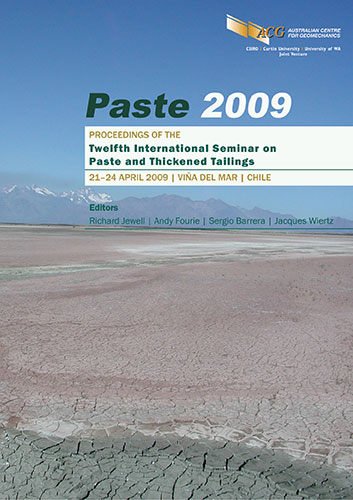Development and Testing of a Laboratory Scale Paste Thickener

|
Authors: Olcay Barreda, RH; de Araujo, AC; Valadão, GES; Hernández, CA |
DOI https://doi.org/10.36487/ACG_repo/963_14
Cite As:
Olcay Barreda, RH, de Araujo, AC, Valadão, GES & Hernández, CA 2009, 'Development and Testing of a Laboratory Scale Paste Thickener', in R Jewell, AB Fourie, S Barrera & J Wiertz (eds), Paste 2009: Proceedings of the Twelfth International Seminar on Paste and Thickened Tailings, Australian Centre for Geomechanics, Perth, pp. 119-128, https://doi.org/10.36487/ACG_repo/963_14
Abstract:
The major objective of this study was the design, construction and testing of a laboratory scale paste thickener. This unit has a modular construction and can be operated on a totally batch mode or as a fully continuous thickener. The thickener was constructed in Plexiglas in order to allow the direct observation of the slurry behaviour inside the equipment. It has two modules reaching a maximum height of 1.2 m with 10 cm of internal diameter. It still makes use of a system for taking samples with orifices of 1cm of internal diameter and equally spaced in the vertical axes by 9 cm. The mineral pastes produced by the equipment were characterised for their rheological properties by means the determination of: viscosity (viscometry), consistency (slump test), fluidity (flume test) and yield stress measurements. The best result without the addition of flocculant in the tests, with the recirculation of the pulp and a residence time of 10 min, was reached when the slurry was taken from orifice number 3 to orifice 1. The paste reached 55.6% of solids by weight under this testing condition. Considering the addition of flocculants the best result was achieved with recirculation of the slurry from orifice number 4 to orifice number 1. This paste reached 53% of solids by weight. Employing two modules of the thickener, the final paste with recirculation reached 56.7% of solids by weight.
References:
ABNT – Associação Brasileira de Normas Técnicas (1998) Norma para concreto. Determinação de consistência pelo
abatimento de cone – NBR NM 67, Rio de Janeiro, p. 18.
Araujo, A.C., Souza, C.C. and Amarante, S.C. (2003) Rejeitos adensados para disposição em superfície – nova
tecnología em Minério de Ferro. IV Simpósio Brasileiro de Minério de Ferro, ABM, Ouro Preto, pp. 610–619.
Clayton, S., Grice, T.G. and. Boger, D.V. (2003) Analysis of the slump test for onsite yield stress measurement of
mineral suspensions, International Journal of Mineral Processing, June 2003, pp. 3–21.
Houman, J. and Johnson, G. (2003) Commissioning and operation of the paste thickening farm at Kimberley combined
treatment plant, 2003 International Seminar on Paste and Thickened Tailings, Australian Centre for
Geomechanics, Perth, Australia, Section 12.
Jewell, R.J. (2002) Paste and thickened tailings in the Australian mining industry, High Density and Paste 2002
Seminar, Santiago, CD-ROM.
Kwak, M., James, D.F. and Klein, K.A. (2005) Flow Behaviour of tailings paste for surface disposal. International
Journal of Mineral Processing, (available online: www.sciencedirect.com).
Slottee, S., Johnson, J. and Crozier, M. (2005) Paste thickening iron ore tailings, VI Simpósio Brasileiro de Minério de
Ferro, ABM, Florianópolis, pp. 904–911.
128 Paste 2009, Viña del Mar, Chile
© Copyright 2026, Australian Centre for Geomechanics (ACG), The University of Western Australia. All rights reserved.
View copyright/legal information
Please direct any queries or error reports to repository-acg@uwa.edu.au
View copyright/legal information
Please direct any queries or error reports to repository-acg@uwa.edu.au